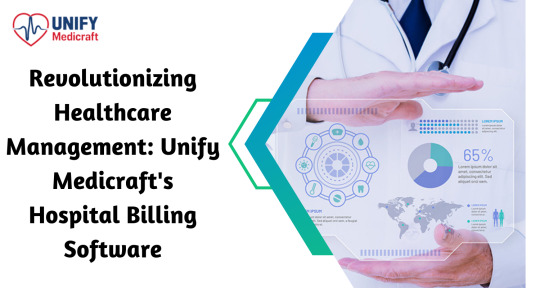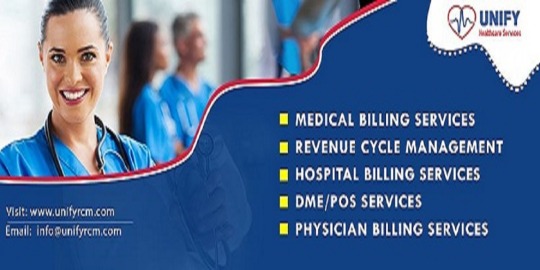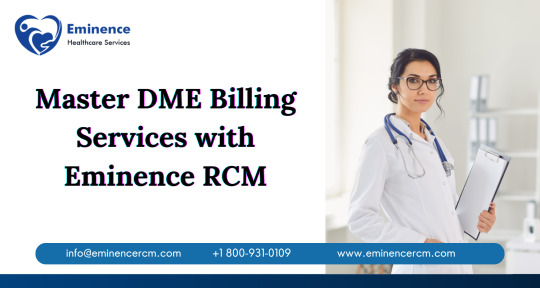#DME Billing.
Text
The Ins and Outs of DME Billing: Expert Insights
Concern for claim denial management is nothing new in the healthcare realm. In fact, it costs US hospitals almost $262 billion annually. This emphasizes the need for an efficient billing process. As the durable medical equipment industry continues to grow, precise DME billing is becoming paramount for maintaining practice’s financial health.

From intricate insurance protocols to frequent claim denials, the daunting process is quite potential to incur a staff burnout. This comes at the cost of your practice’s efficiency and reputation. That’s why you can use an expert’s insights as a guiding tool in DME billing services, offering invaluable strategies drawn from years of experience and knowledge.
Professional Observations in DME Billing Success
From leveraging advanced software solutions to fostering transparent communication with the patients and payors, these observations contribute to augmented DME billing workflow, ensuring seamless reimbursements.
Exhibit open communication channels: A lucid communication channel is essential to maintain transparency regarding payments. You must ensure patients understand their financial responsibilities by utilizing the information within the billing process.
Keep patient information updated: Information is the key to an efficient DME billing process. Gather accurate and up-to-date information about the patient whether it’s demographic or clinical. Also stay updated about their insurance coverage plans as it has an impact on the billing process.
Review errant claims: Dedicated DME billers and coders to follow up on delinquent claims allow you to identify the payment delays. Furthermore, you will be able to understand the reasons behind denied claims and take proactive actions to mitigate the same.
Track and analyze denials: Tracking denials is paramount for effective DME billing. You must consider data-analytics within the process to identify the reasons, rates and patterns in the claim denials. Common reasons for claim denials include insufficient patient information, coding errors, incorrect or insufficient documentation and so on. Track the claims to identify and rectify these issues for better claim approvals.
Conduct regular audits: Consistent audits of your billing process help you identify the gaps between the standardized practices and existing practices. You can actively address discrepancies in practices and mitigate risks. Additionally, you can analyze the need for training and educating your staff regarding regulatory changes and coding guidelines.
Foster collaboration: To ensure accurate billing, encourage communication and collaboration between billing and clinical team. You must form a synergy between departments to ensure a streamlined operation.
Outsource DME Billing Services: Partnering with DME billing professionals can enhance the billing and coding services within your practice. An outsourced partner is well-versed in advanced technology and intricacies within the billing and coding practices. It allows you to focus on quality patient care while ensuring accurate and timely reimbursements.
Leverage Sunknowledge Benefit
By partnering with Sunknowledge Inc Services for your DME billing operations- you can be assured of increased revenue and elevated quality of patient care. The company has been operating in the realm for more than a decade and worked with some of the largest DME providers in the country with great references.
With comprehensive technology implementation and HIPAA compliance measures, the team works as an operational arm for your practice while reducing your overhead costs. In fact, the cost of hiring an in-house professional in the State of California is almost $50 per hour, whereas they provide you with an end-to-end revenue cycle management at just $7 per hour across the country.
Fostering trust and flexibility and a consistent quality service is the main objective of Sunknowledge team. You can engage in a discussion with them over a no-commitment call to understand their proactive approach in solving your coding and billing challenges.
0 notes
Text
Optimizing Revenue Recognition in Durable Medical Equipment Billing
In the complex healthcare billing landscape, revenue recognition stands out as a critical aspect for durable medical equipment (DME) providers. Accurate and timely revenue recognition ensures financial stability and regulatory compliance. However, navigating the complexities of revenue recognition in DME billing can be challenging due to evolving regulations, payer complexities, and varying reimbursement methodologies. This article aims to explore strategies and best practices to optimize revenue recognition in DME billing.
Understanding Revenue Recognition in DME Billing
Revenue recognition in DME billing involves the process of recording and reporting revenue generated from the sale or rental of durable medical equipment. Unlike other industries, healthcare billing, including DME, is subject to strict regulatory requirements, such as those outlined by the Centers for Medicare and Medicaid Services (CMS) and private payers.

Key Considerations in Revenue Recognition for DME Billing Include:
Documentation Requirements: Proper documentation of medical necessity, prescription orders, and supporting clinical notes is crucial for revenue recognition. Incomplete or inaccurate documentation may result in claim denials or delays in reimbursement.
Billing and Coding Compliance: Compliance with correct billing codes and modifiers is essential for accurate revenue recognition. DME providers must stay up to date with coding guidelines and regulatory changes to avoid billing errors and potential compliance issues.
Payer Policies and Reimbursement Rates: Understanding payer policies and reimbursement rates is critical to optimizing revenue recognition. Different payers may have different coverage criteria, prior authorization requirements, and reimbursement methodologies, which affects revenue attainment.
Strategies to Optimize Revenue Recognition
Invest in Staff Training and Education:
It is critical to ensure that billing staff are well trained and knowledgeable about DME billing regulations, coding guidelines, and payer policies. Continuing education programs can help staff stay up to date on industry changes and best practices, reducing errors and improving revenue capture.
Implement Robust Documentation Processes:
It is essential to develop standardized documentation processes that capture all information necessary for claims submission. This includes ensuring that medical necessity is clearly documented, prescriptions are valid, and supporting clinical notes are complete. Automated systems can streamline documentation processes and minimize errors.
Conduct Periodic Audits and Reviews:
Regular audits of billing, claims and documentation processes can identify areas for improvement and compliance risks. By conducting internal audits or engaging third-party audit services, DME providers can proactively address issues, mitigate risks, and optimize revenue recognition.
Take Advantage of Technological Solutions:
Using advanced billing software and revenue cycle management (RCM) systems can improve efficiency and accuracy in revenue recognition. These solutions automate billing processes, facilitate claims submission, and provide insights through analytics, allowing DME providers to identify revenue optimization opportunities.
Improve Communication With Payers and Referring Providers:
Establishing open communication channels with payers and referring providers is essential to clarify coverage policies, resolve claim disputes, and address reimbursement issues promptly. Building collaborative relationships can facilitate smoother revenue recognition processes and improve overall financial performance.
Monitor key performance indicators (KPIs):
Tracking KPIs such as days sales outstanding (DSO), denial rates, and revenue per patient can provide valuable insights into revenue cycle performance. By monitoring KPIs regularly, DME providers can identify trends, measure progress against benchmarks, and make data-driven decisions to optimize revenue recognition.
Best Practices for Revenue Recognition Compliance
In addition to implementing optimization strategies, adhering to best practices for revenue recognition compliance is crucial for DME providers. Some best practices include:
Stay Up to Date With Regulatory Changes: Monitor regulatory updates from CMS, Healthcare Common Procedure Coding System (HCPCS), and other governing bodies to ensure compliance with billing regulations and coding guidelines.
Maintain Accurate Documentation: Document all patient encounters, medical needs, and billing activities accurately and completely to support claims and mitigate compliance risks.
Promptly Follow Up on Denied Claims: Establish a process to identify and resolve denied claims quickly to prevent revenue leakages and minimize reimbursement delays.
Conduct Regular Compliance Training: Provide ongoing training to staff on compliance requirements, ethical billing practices, and fraud prevention to maintain a culture of compliance within the organization.
Engage Legal and Compliance Experts: Seek guidance from legal and compliance experts to ensure billing practices align with regulatory requirements and industry standards.
Conclusion
Optimizing revenue recognition in DME billing services require a proactive approach that encompasses staff education, robust processes, technology adoption and compliance. By implementing the strategies and best practices outlined in this article, DME providers can optimize billing operations, improve revenue capture, and ensure compliance with regulatory requirements, ultimately fostering financial stability and sustainability in an overall landscape. dynamic healthcare system.
0 notes
Text
Your Ultimate DME Billing Solution | Eminence RCM

Navigating the complex landscape of Durable Medical Equipment (DME) billing can be daunting due to constantly changing payor policies, reimbursement regulations, and compliance requirements. Staying updated with these industry changes is crucial but can be frustrating without expert knowledge. To achieve the best outcomes, partnering with a trusted industry expert is essential for precise DME billing service.
Eminence RCM stands out as a leading provider of DME billing services. By choosing Eminence RCM, you gain a partner that expertly handles document review, claims submission, accounts receivable, and cash posting. Our goal is to reduce denials and streamline your revenue cycle through our professional DME billing solutions.
0 notes
Text
Revolutionizing Healthcare Management: Unify Medicraft's Hospital Billing Software
In the ever-evolving landscape of healthcare, efficiency, accuracy, and transparency are paramount. Hospital billing, a crucial aspect of healthcare administration, often encounters challenges ranging from complex coding requirements to managing insurance claims. Recognizing these challenges, Unify Medicraft has emerged as a pioneer in revolutionizing healthcare management through its cutting-edge hospital billing software.
Unify Medicraft hospital billing software stands out for its comprehensive features designed to streamline the billing process, enhance revenue cycle management, and improve overall operational efficiency within healthcare institutions.

1. Seamless Integration:
One of the standout features of Unify Medicraft's hospital billing software is its seamless integration capabilities. The software seamlessly integrates with existing hospital management systems, electronic health records (EHR), and other essential healthcare software, ensuring a smooth transition and minimal disruption to daily operations. This integration eliminates the need for manual data entry, reducing errors and improving accuracy in billing processes.
2. Automated Billing Processes:
Manual billing processes are not only time-consuming but also prone to errors. Unify Medicraft's software automates various billing tasks, including charge capture, claim generation, and submission. By leveraging advanced algorithms and machine learning capabilities, the software accurately codes services, diagnoses, and procedures, ensuring compliance with regulatory requirements and maximizing reimbursement rates.
3. Real-Time Eligibility Verification:
Insurance eligibility verification is a critical step in the billing process, yet it can be labor-intensive and prone to delays. Unify Medicraft's hospital billing software offers real-time eligibility verification, allowing healthcare providers to instantly verify patients' insurance coverage and eligibility for services. This feature minimizes claim denials due to eligibility issues and accelerates the revenue cycle by facilitating prompt billing.
4. Claims Management and Denial Prevention:
Managing insurance claims and preventing denials are major challenges faced by healthcare institutions. Unify Medicraft's software simplifies claims management by providing intuitive tools for tracking claim status, identifying bottlenecks, and resolving issues promptly. Additionally, the software utilizes built-in analytics to identify patterns and trends that may lead to claim denials, allowing healthcare providers to take proactive measures to prevent them.
5. Customizable Reporting and Analytics:
Data-driven insights are invaluable for optimizing revenue cycle management and identifying areas for improvement. Unify Medicraft's hospital billing software offers customizable reporting and analytics capabilities, allowing healthcare administrators to generate comprehensive reports tailored to their specific needs. These reports provide actionable insights into key performance indicators, revenue trends, and operational efficiencies, empowering healthcare providers to make informed decisions and drive continuous improvement.
6. Compliance and Security:
Compliance with healthcare regulations such as HIPAA (Health Insurance Portability and Accountability Act) is non-negotiable when it comes to managing patient data and billing information. Unify Medicraft's software prioritizes compliance and data security, employing robust encryption protocols and access controls to safeguard sensitive information. Additionally, the software undergoes regular updates to ensure adherence to evolving regulatory standards, providing healthcare institutions with peace of mind and mitigating the risk of non-compliance.
7. Scalability and Flexibility:
As healthcare institutions grow and evolve, their billing needs may change accordingly. Unify Medicraft's hospital billing software is designed with scalability and flexibility in mind, accommodating the evolving needs of healthcare providers. Whether it's adding new functionalities, integrating with third-party systems, or scaling up to support increased patient volumes, the software adapts seamlessly to meet the changing demands of healthcare organizations.
8. Enhanced Patient Experience:
A seamless billing process not only benefits healthcare providers but also enhances the overall patient experience. Unify Medicraft's software prioritizes patient-centricity by offering transparent billing practices, easy-to-understand statements, and convenient payment options. By simplifying the billing experience for patients, healthcare providers can improve patient satisfaction and loyalty, ultimately leading to better outcomes and increased patient retention.
Conclusion:
In an era where healthcare delivery is increasingly complex and demanding, Unify Medicraft's hospital billing software emerges as a beacon of innovation and efficiency. By streamlining billing processes, enhancing revenue cycle management, and prioritizing compliance and patient-centricity, the software empowers healthcare providers to focus on what matters most – delivering high-quality care to their patients. As healthcare continues to evolve, Unify Medicraft remains at the forefront, driving positive change and revolutionizing healthcare management for the better.
#medicaid billing software#medical billing software#billing software#best rcm software#dental billing software#dme billing software#hme billing services
0 notes
Text
Transform Your Revenue Cycle Management: Attain Financial Stability
This Blog was originally published by Unify RCM.
https://www.unifyrcm.com/transform-your-revenue-cycle-management.php
Revenue cycle management remains to be one of the priorities for healthcare providers and practices in 2024.
The constant juggle between offering the best quality of patient care and elevating revenue can be stressful. On the other hand, losing revenue restrains healthcare practices from providing the best that they can.
Together with this, the complexities of medical billing and coding add to the administrative workload. Amidst this, medical billing services act as the crucial aspect to not just enhance revenue but also improve the workflow of operations.
A wholesome combination of professional assistance along with dedicated patient care is all a healthcare practice needs to grow financially.
This blog highlights the concept of revenue cycle management and its importance in the financial success of healthcare practices. It will also put a spotlight on the valuable contribution of medical billing services in uplifting the bottom line.

Explanation of Revenue Cycle Management
Essentially, revenue cycle management is all about implementing control and handling the different steps in medical billing. It's nothing but the management of all administrative work to get adequate cash inflow.
When a healthcare provider or practice successfully fulfills all the requirements, they can achieve financial stability. That is why every step in the process of medical billing needs to be done with precision.
RCM is a collective process where everything is kept in check including the workflow and operational functioning. Combining all aspects, it is dedicated to streamlining medical billing and coding with accuracy and efficiency.
This whole point is narrowed down to prevent errors and mistakes in billing to mitigate the potential risk of revenue leakage
Effective RCM for Financial Upgradation is the Need of the Hour
Healthcare providers and practices need a better and more productive RCM to attain financial upgradation. Whether they will be able to reach their goal is completely a matter of effective medical billing and coding.
Efficient RCM plays a vital role in handling claims, their filing, submission, and processing strategically. It works with complete optimization, progressive technologies, and a proactive approach to realize healthcare practices' full potential.
Additionally, a smooth flow of RCM strengthens the healthcare practice and prepares it to handle the ups and downs in the economy. Comprehensive attention makes the healthcare practice stronger to sustain competition and strive to maintain the quality of care to patients
Revenue Cycle Management in 2024
As the medical billing landscape is expanding, healthcare providers are looking forward to ease of handling administrative tasks. Many efforts have already been made to solve healthcare practices, and it is only the beginning
In 2024, healthcare providers and practices want to indulge in medical billing services where all their hassle is taken care of by experts.
There is a requirement for technologically advanced medical billing and coding solutions for a subsequent reduction in errors and drawbacks.
One more aspect that is gaining attention in 2024 is reporting and analytics to understand the performance of healthcare practices. All in all, healthcare providers and practices want robust strategies to meet financial stability in the dynamic medical billing environment.
Puzzle Pieces of Revenue Cycle Management
We can say that the steps in medical billing are the puzzle pieces of RCM and all of them are crucial. From the first step to the last, every bit of medical billing and coding is necessary to enhance revenue.
Patient Entry
The first step is patient registration, and this happens at the time of appointment. At this initial step itself, major information regarding patients, their insurance, and medical history is recorded. It is the foundational step, and this sets the pace for the coming steps in the process.
Claim Filing
Once the patient receives treatment, the rendered services are translated into accurate codes for claim filing. Coding errors are major mistakes in medical billing and often lead to the maximum number of claim denials
That is why it becomes important to hand over claim filing to professional coders and billers. Providentially, Medical billing services can prevent errors in coding with a persistent team of expert coders
Submission of Claims and Follow-up
After the claims are filed, it is time for claim submission to respective insurance companies for further processing. This step is done right when healthcare providers submit the claims on time and within the due date. Otherwise, the claims get denied and healthcare providers face revenue loss.
After the submission of claims, healthcare providers also need to ensure proper denial management and follow-up. This is essential in case there are denials. Healthcare providers can re-file claims after making some alterations to recover the lost revenue
The follow-up process prevents major reimbursement loss, which is why it must not be neglected or missed.
Revenue Collection
The final and ultimate step is the collection of reimbursement. If healthcare providers have reached this point that means they have successfully handled the medical billing process and revenue cycle management
The Role of Medical Billing Services in Elevating Revenue Cycle Management
Let's explore all the benefits of medical billing services
Financial Upliftment
The major advantage is financial stability, and a proper RCM allows a continuous flow of funds. When there is a reduction in revenue loss, healthcare providers and practices experience noticeable financial upliftment.
Elimination of Administrative Burden
Medical billing services reduce the overall administrative burden by taking complete responsibility for RCM. They employ a team of experts along with advanced technological tools and free healthcare providers from extensive paperwork.
Improvement in Patient Experience
As healthcare providers outsource medical billing services, they get more time to deal with the patients and provide the best quality treatments and procedures. When healthcare providers work with an untroubled mind, there is an improvement in patient experience.
Proactive Decision Making
A medical billing company helps healthcare providers in many ways and one such way is proactive decision making. The professional team fosters data reporting and defines performance so making decisions for the future becomes easy
Such insights help in maximizing revenue and improving revenue cycle management with proper planning and execution.
Compliance with Regulatory Standards
Compliance standards are an unmissable part of medical billing. This is also a factor that keeps altering. Whether it is HIPAA compliance or other coding compliance, outsourcing partners ensure the fulfillment of them all.
This protects healthcare providers from legal action and maintains their reputation among patients and other related individuals.
Expedite Processing of Claims
The direct impact of partnering with well-versed companies is the elimination of medical billing roadblocks. Reduction in errors leads to limited denial of claims which further contributes to speedy claim processing.
This is possible because professional assistance results in accuracy, timeliness, compliance, and adequate revenue
Unify Healthcare Services for Effective Revenue Cycle Management
Expertise and proficiency can improve RCM in so many ways and healthcare providers will bear the fruits. Outsourcing is a one-stop solution to coding complexities, rising claim denials, and revenue leakage
Unify Healthcare Services is a medical billing company in USA that provides complete medical billing and coding services. We have dealt with thousands of healthcare providers and helped them in their journey to achieve a robust RCM.
Our proficient coders and billers offer overall accuracy and never miss any details. Our essential services can deliver what you are looking for.
Choose Unify Healthcare Services and maintain a healthy Revenue Cycle Management!
#medical billing and coding#medical billing services#medical billing outsourcing#hospital#healthcare#dme billing services#hospital billing services
0 notes
Text
DME Medical Billing Companies
Billing for durable medical equipment can be challenging due to coding requirements, billing requirements, and when to submit claims. Outsourcing your DME billing services to Technical Advantage Services, one of the leading DME medical billing companies, can solve all such problems while ensuring higher reimbursements. Get in touch with us now.

0 notes
Text
https://www.authortalking.com/the-future-of-dme-medical-billing-trends-to-watch-in-2024/#google_vignette
This transition has been driven by the need for specialized expertise amidst a backdrop of complex regulatory demands and technological advancements. As we look towards 2024, the momentum towards outsourcing to DME billing experts is expected to accelerate, reflecting an industry that is increasingly embracing flexibility and specialized proficiency to navigate its intricate nature.
0 notes
Text
Easy Step-by-Step Guide to Mastering Medicare DME Billing
Discover the key to maximizing your Medicare DME billing and compliance efficiency with our comprehensive guide. Ensure proper reimbursement and regulatory adherence for your healthcare practice. Stay informed about Medicare DME criteria, maintain precise billing practices, and embrace best compliance approaches. At Accqdata, we're your dedicated DME billing experts, helping you align your DME billing process with Medicare's requirements.
By prioritizing compliance, you safeguard both your practice's reputation and financial stability. With our guidance, you can streamline operations, keep patients satisfied, and revenue flowing smoothly. Start your journey toward a thriving practice today and navigate the complexities of Medicare DME billing and coverage confidently with Accqdata.

0 notes
Text
Emergency Medical Billing | Unify RCM

Unify Healthcare Services specializes in providing emergency medical billing solutions, providing comprehensive billing solutions for emergency medicine practices. The team of billing experts understands the unique complexities of emergency medicine billing and coding, ensure accurate documentation, coding, and timely claims submission. By partnering with Unify Healthcare Services, emergency medicine practices can optimize their revenue cycle, maximize reimbursements, and streamline their billing processes.
#medical billing solutions#hme billing company#dme billing services#emergency medical billing#unifyrcm#billing and coding#unifyhealthcare#billingprocess
0 notes
Text
Benefits of Outsourcing Revenue Cycle Management
Outsourcing Revenue Cycle Management (RCM) has become a strategic solution for healthcare providers looking to optimize their financial operations and focus on core patient care. CyberHelp HealthSolution understands the complexities involved in managing RCM. So, we provide a seamless and smooth transition in medical billing.

0 notes
Text
Enhancing Compliance with HIPAA Regulations in DME Billing
In the healthcare industry, compliance with the Health Insurance Portability and Accountability Act (HIPAA) regulations is paramount to protecting patient privacy and ensuring the security of healthcare information. This is especially critical in Durable Medical Equipment (DME) billing, where sensitive patient data is routinely exchanged between providers, suppliers, and payers. This comprehensive guide explores the importance of HIPAA compliance in DME billing and provides strategies for enhancing compliance to safeguard patient information and mitigate risks.
Understanding HIPAA Regulations in DME Billing
The Health Insurance Portability and Accountability Act (HIPAA) was enacted in 1996 to establish national standards for protecting the privacy and security of personal health information (PHI). HIPAA regulations apply to covered entities, such as healthcare providers, health plans, and healthcare clearinghouses, as well as their business associates, including DME suppliers and billing companies.

Key Components of HIPAA Regulations Relevant to DME Billing Include
Privacy Rule:
The HIPAA Privacy Rule governs the use and disclosure of PHI by covered entities and their business associates. It establishes safeguards to protect the privacy of patients' health information and grants individuals certain rights regarding their PHI, such as the right to access and request amendments to their records.
Security Rule:
The HIPAA Security Rule outlines requirements for safeguarding electronic PHI (ePHI) against unauthorized access, use, and disclosure. Covered entities and business associates must implement administrative, physical, and technical safeguards to protect the confidentiality, integrity, and availability of ePHI.
Breach Notification Rule:
The HIPAA Breach Notification Rule requires covered entities and their business associates to notify affected individuals, the Department of Health and Human Services (HHS), and, in some cases, the media, following the discovery of a breach of unsecured PHI. The rule establishes criteria for assessing the severity of breaches and determining appropriate notification requirements.
Enforcement Rule:
The HIPAA Enforcement Rule outlines procedures for investigating complaints of HIPAA violations and imposing penalties for non-compliance. The Office for Civil Rights (OCR) within the HHS is responsible for enforcing HIPAA regulations and conducting audits to assess compliance among covered entities and business associates.
Challenges in Achieving HIPAA Compliance in DME Billing
DME billing services presents unique challenges in achieving and maintaining compliance with HIPAA regulations due to the following factors:
Complexity of Data Exchange:
DME billing involves the exchange of sensitive patient information, including diagnosis codes, treatment plans, and insurance details, between multiple parties, including healthcare providers, suppliers, insurers, and patients. Managing and securing this data across different systems and stakeholders can be challenging and requires robust privacy and security measures.
Use of Electronic Health Records (EHRs):
Many DME suppliers and billing companies rely on electronic health record (EHR) systems to manage patient information and billing processes. While EHRs offer efficiency and convenience, they also introduce security risks if not properly configured and protected. Ensuring the security of ePHI stored in EHRs is essential for HIPAA compliance in DME billing.
Business Associate Relationships:
DME suppliers often engage third-party billing companies or service providers to handle billing and reimbursement processes on their behalf. These business associates are subject to HIPAA regulations and must enter into business associate agreements (BAAs) with covered entities to ensure compliance. Managing relationships with business associates and monitoring their adherence to HIPAA requirements is crucial for protecting patient information.
Evolving Regulatory Landscape:
HIPAA regulations are subject to updates and revisions in response to changing technologies, healthcare practices, and security threats. Staying abreast of regulatory changes and implementing necessary adjustments to policies, procedures, and safeguards is essential for maintaining compliance in DME billing.
Strategies for Enhancing Compliance with HIPAA Regulations in DME Billing
Conduct Regular Risk Assessments:
Perform regular risk assessments to identify vulnerabilities and threats to the confidentiality, integrity, and availability of ePHI in DME billing processes. Assess risks related to data storage, transmission, access controls, and third-party relationships, and develop mitigation strategies to address identified risks.
Implement Policies and Procedures:
Develop comprehensive policies and procedures that govern the use, disclosure, and safeguarding of PHI in DME billing operations. Document policies related to access controls, data encryption, incident response, and employee training, and ensure that staff members are trained on HIPAA compliance requirements and procedures.
Secure Electronic Systems and Devices:
Implement technical safeguards to secure electronic systems, devices, and networks used in DME billing activities. Encrypt ePHI stored on servers, workstations, and mobile devices, and implement access controls, authentication mechanisms, and audit trails to monitor and track access to PHI.
Train Staff on HIPAA Compliance:
Provide regular training and education to staff members involved in DME billing on HIPAA regulations, policies, and best practices. Ensure that staff members understand their roles and responsibilities in protecting patient information and responding to potential security incidents or breaches.
Monitor and Audit Compliance Activities:
Implement monitoring and auditing mechanisms to track compliance with HIPAA regulations and internal policies. Conduct regular audits of access logs, system configurations, and user activities to detect and address potential security violations or breaches proactively.
Secure Business Associate Relationships:
Enter into business associate agreements (BAAs) with third-party billing companies, service providers, and other business associates involved in DME billing processes. Ensure that BAAs include provisions for safeguarding PHI, reporting security incidents, and complying with HIPAA regulations.
Respond to Security Incidents and Breaches:
Establish incident response procedures to guide the response to security incidents or breaches involving ePHI. Develop protocols for investigating incidents, containing breaches, notifying affected individuals and authorities, and mitigating the impact on affected individuals and the organization.
Stay Informed About Regulatory Updates:
Stay informed about changes to HIPAA regulations, guidance, and enforcement priorities issued by the Department of Health and Human Services (HHS) and the Office for Civil Rights (OCR). Monitor industry developments, participate in training programs and conferences, and engage with professional associations to stay abreast of regulatory updates and best practices in HIPAA compliance.
Conclusion
Enhancing compliance with HIPAA regulations in DME billing is essential for protecting patient privacy, safeguarding sensitive health information, and mitigating risks associated with data breaches and security incidents.
By understanding the regulatory requirements, implementing robust security measures, and fostering a culture of compliance within the organization, DME suppliers, billing companies, and other stakeholders can ensure the confidentiality, integrity, and availability of electronic protected health information (ePHI). Investing in HIPAA compliance not only protects patients and strengthens provider-patient relationships but also enhances organizational reputation, operational efficiency, and competitiveness in the healthcare marketplace.
0 notes
Text
Master DME Billing Services with Eminence RCM
This Article is originally published by Eminence RCM.
In the ever-evolving landscape of healthcare, durable medical equipment (DME) plays a crucial role in improving patient outcomes and quality of life. From wheelchairs to oxygen tanks, DME encompasses a broad spectrum of equipment essential for managing various medical conditions. However, navigating the complexities of DME billing can be daunting for healthcare providers, often leading to billing errors, claim denials, and revenue loss.
Enter Eminence RCM, a leading provider of Revenue Cycle Management (RCM) services specializing in DME billing. With a blend of cutting-edge technology, industry expertise, and personalized customer service, Eminence RCM is revolutionizing the way healthcare providers manage their DME billing processes. Let’s delve deeper into the realm of DME billing services by Eminence RCM and explore how they are helping healthcare providers streamline operations, maximize revenue, and enhance patient care.

Understanding DME Billing Challenges
Before diving into the solutions provided by Eminence RCM, it’s crucial to grasp the challenges inherent in DME billing. Unlike traditional medical services, DME billing involves intricate documentation requirements, coding specificity, and stringent compliance regulations. Moreover, the ever-changing landscape of healthcare regulations and payer policies adds another layer of complexity.
Common challenges faced by healthcare providers in DME billing include:
Complex Documentation Requirements: Each DME item requires detailed documentation, including prescription orders, medical necessity justification, and proof of delivery, among others.
Coding and Billing Errors: Accurate coding is paramount in DME billing to ensure timely reimbursement. However, the multitude of HCPCS (Healthcare Common Procedure Coding System) codes and frequent updates make coding a challenging task prone to errors.
Claim Denials and Rejections: DME claims are susceptible to denials and rejections due to incomplete documentation, coding errors, or failure to meet medical necessity criteria.
Payer Policy Compliance: Different payers have varying coverage policies and reimbursement guidelines for DME items, requiring meticulous adherence to ensure claims acceptance and optimal reimbursement.
The Eminence RCM Advantage
Eminence RCM understands the intricate nuances of DME billing and offers tailored solutions to address these challenges effectively. Here’s how Eminence RCM sets itself apart in the realm of DME billing services:
Expertise in DME Billing Regulations: With a team of seasoned billing experts well-versed in DME billing regulations, Eminence RCM ensures compliance with Medicare, Medicaid, and commercial payer guidelines. Their in-depth understanding of documentation requirements and coding specificity minimizes the risk of claim denials and rejections.
Advanced Technology Integration: Eminence RCM leverages state-of-the-art technology and billing software to streamline DME billing processes. From automated claim generation to real-time claim tracking, their technology-driven approach enhances efficiency and accuracy while reducing administrative burden.
Customized Revenue Cycle Solutions: Recognizing that one size doesn’t fit all, Eminence RCM offers customized revenue cycle solutions tailored to the unique needs of each healthcare provider. Whether it’s optimizing workflow processes, implementing coding best practices, or conducting staff training, their solutions are designed to maximize revenue and operational efficiency.
Proactive Denial Management: Eminence RCM employs proactive denial management strategies to minimize claim denials and rejections. Through thorough claim scrubbing, coding audits, and appeals management, they identify and rectify potential issues before claims are submitted, ensuring a higher acceptance rate and faster reimbursement.
Dedicated Customer Support: Eminence RCM prides itself on delivering exceptional customer service. With a dedicated team of support staff available round-the-clock, they provide prompt assistance and personalized guidance to address client queries and concerns promptly.
By entrusting the billing processes to Eminence RCM, providers have experienced:
Improved Cash Flow: Timely and accurate claim submission results in faster reimbursement, leading to improved cash flow and financial stability for healthcare practices.
Reduced Administrative Burden: Outsourcing DME billing to Eminence RCM allows healthcare providers to focus on delivering quality patient care without the hassle of managing complex billing processes.
Increased Revenue Capture: Through optimized billing practices and proactive denial management, Eminence RCM helps healthcare providers maximize revenue capture and mitigate revenue leakage.
Conclusion
In an era where healthcare providers face mounting pressure to deliver quality care while navigating complex regulatory requirements, partnering with a trusted RCM provider like Eminence RCM can make all the difference. By leveraging their expertise, technology-driven solutions, and commitment to customer satisfaction, Eminence RCM empowers healthcare providers to overcome DME billing challenges, optimize revenue, and enhance patient care delivery. With Eminence RCM by their side, healthcare providers can embark on a journey towards operational excellence and financial success in the dynamic landscape of healthcare.
#best medical billing companies in usa#medical billing services#healthcare#dme billing services#rcm companies in usa#revenue cycle management services#healthcare revenue cycle management services#eminence rcm#dme medical billing companies
0 notes
Text

Are you ready to revolutionize the approach of your medical billing process? Unify Healthcare Services is thrilled to announce our participation at Medtrade 2024, the premier international trade conference for the healthcare industry. The event is taking place at the Kay Bailey Hutchison Convention Center in Dallas, TX, from March 26th to 28th. Let's unlock the potential of healthcare billing together!
#medtrade2024#DME#HME#medicalbilling#medical billing and coding#RCM#revenue cycle management services
0 notes
Link
#DME Billing Service#DME Billing Management#DME Billing Professionals#DME Billing Company#HME Billing Solutions#Durable Medical Equipment Billing#Outsource DME Billing Services
0 notes
Text
0 notes